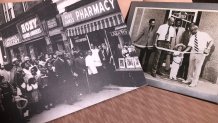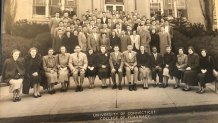In 1960, the first-Black owned pharmacy inside the City of Hartford opened its doors during a time when there were few Black pharmacists. The Ford James Pharmacy made history in Hartford for years serving the community and supplying medication to those who needed it until 1980.
In 1960, the first-Black owned pharmacy inside the City of Hartford opened its doors during a time when there were few Black pharmacists.
The Ford James Pharmacy made history in Hartford for years serving the community and supplying medication to those who needed it until 1980.
Stream Connecticut News for free, 24/7, wherever you are.
Owning the first Black pharmacy was a benchmark few Black pharmacists achieved inside the state, according to Anita Ford Saunders, daughter of Alfred D. Ford.

Get top local Connecticut stories delivered to you every morning with the News Headlines newsletter.
Alfred Ford's journey to become a pharmacists dates back to just after World War II after his time serving as an officer in the U.S. Army.
Ford got the idea to pursue pharmacy after a friend noticed his intellect and his commitment to better himself.
"He worked hard, really hard for his community and he wanted to serve his community," said Ford Saunders. "It was a lot of work for my dad, but he persevered."
Ford graduated from UConn's pharmacy school in 1950. He was one of the two Black pharmacists to graduate in that year.

During the years after graduation, Ford ran into a few obstacles as a Black pharmacist.
Local
"It was hard for him to get a job as a pharmacists, especially a Black pharmacist. A lot of businesses didn't hire him," said Ford Saunders.
Alfred Ford would eventually get a break and started to work overnight at Arthur's Drug Store, one of the few white-owned pharmacies which welcomed black workers.
"He really got the experience there," said Ford Saunders. "That opportunity really helped him build out his career."
After years of working at that pharmacy, he found out about a store for sale right up the street. Ford and Horace James partnered together to open the first Black-owned pharmacy in the city in 1960 on Main and Russell streets. The pair ran into a challenges before the opening.
"Banks wouldn't give them loans. The banks might want to give them a loan at like 22 percent," said Ford Saunders.
The pair persevered, relying on the community for financial support. They would open the drug store and kept it open for more than 20 years.

"It really makes us proud, I mean it's always made us proud," said Ford Saunders. "He really impacted not only those who went on to be pharmacists or doctors, but other young men who just were around him and watched him and watched his worked ethic.”
The pair made sure to build important relationships with the community and tried to establish a community-like feel when entering into the business.
"When the doctors weren't thinking about the whole picture in terms of the medications that people may have already been on, the pharmacists would know the patients' medication history a little bit better," said Ford Saunders. "There were times when people would come into get their prescriptions and they didn’t have money and you know, my father would say 'that’s fine' and they might bring in a bag of potatoes.”
Ford would hold onto the pharmacy even after the riots in the 1960s after the assignation of Dr. Rev. Martin Luther King Jr., which left the store with a few shattered window glasses.
Diversity in the industry remains of high importance even in 2022.
"People of color have become perhaps the major group in pharmacy over the last 10-15 years and the women in pharmacy make up about 60 percent of pharmacists now," said Nathan Tinker, C.E.O of C.T.'s Pharmacists Association. "Pharmacists are really tied into their local establishments and their local areas and so being able to walk into a pharmacy and see people of your own color, history and heritage and ethnicity is important."
Ford lived until he was 91 years old and for many, his legacy lives on.
“I enjoy telling people the story because when buildings are torn down as we talked about, people forget," said Ford Saunders.



